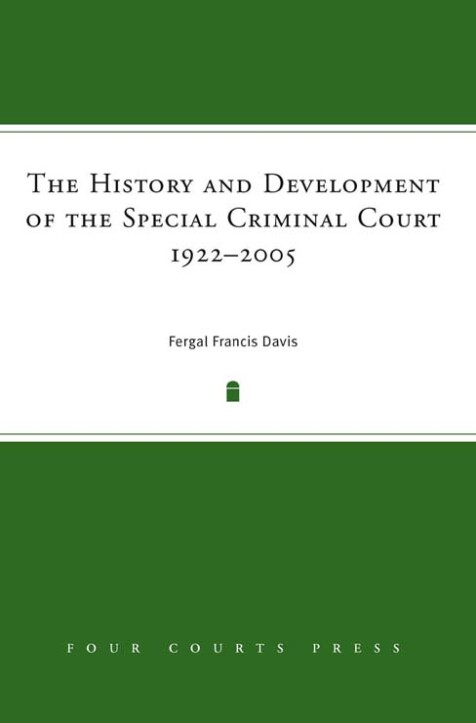The history and development of the Special Criminal Court, 1922–2005
Fergal Davis
'Davis has written a book whose scope is rather wider than the title indicates. It has much for those with a general interest in Irish history', George L. Gretton, Edinburgh Law Review (2008).
'Fergal Davis has written a cool, even handed account of the history of special courts in Ireland since the establishment of the Irish Free State in 1922 .... He purports in his opening chapter to address not only the development of the courts themselves but also what he calls their 'legitimacy' .... He handles the chronological progression very well and his examination of the relevant legislation is keen and thoughtful. He also provides interesting analysis of the background to a number of important trials .... The recent history of the special court merits a book to itself, though Fergal Davis manages to provide a clear and succinct outline of its workings in his final chapters .... this book, apart from Mary Robinson's useful monograph from 1974 on the same subject, is very welcome indeed, being the only full account available of the Irish experience of extra-judicial courts. The 'history and development' parts are especially well researched and presented and the book as a whole will prove indispensable to those involved in legal research, constitutional studies and human rights projects', Michael O'Sullivan (Irish Democrat online 2009).
'Davis describes the attempts by the fledgling Irish Free State to deal with the illegal armies that threatened its existence, in particular the Irish Republican Army (IRA), but also the Blueshirts. This was a time of sporadic violence, national uncertainty, and harsh justice. The evolution of the Offences against the State Act 1939, which provided a legislative basis for the Special Criminal Court, is recounted in detail. This was an important weapon in the government's fight against subversion, to be deployed when it was satisfied that the threat of juror intimidation was such that the ordinary courts were inadequate to secure the effective administration of justice and the preservation of public peace and order. It was reinforced by internment, judicial execution, and, in 1940, the establishment of a Military Court .... On balance, Davis is sympathetic to the continued existence of the Special Criminal Court, subject to the introduction of a number of safeguards around how cases are referred to it .... His book is a nice blend of archival work, legal scholarship, and proposals for law reform. While his view that the Special Criminal Court is a 'proportionate response'(189) to the crime threat currently facing the Irish State is contestable, he makes his case carefully, and the reader, if not fully convinced, is much better informed', Ian O'Donnell, Journal of British Studies.
'The epithet “special” is seldom applied to courts or legal procedure as a term of praise, and more frequently to signify a departure from the ordinary criminal process to meet a state of emergency. As with the “special jury” authorised under the Criminal Law and Procedure (Ireland) Act 1887, and the “special powers” granted by the Civil Authorities (Special Powers) Act 1922, so too with the Special Criminal Court (“SCC”), brought into force in Eire by the Offences against the State Act 1939 so that “scheduled” criminal offences could be tried by a court sitting without a jury. In this welcome study, the first comprehensive review of the SCC since Professor Mary Robinson’s book in 1974 (The Special Criminal Court), Fergal Davis sets out to consider “the evolution of the [SCC] and the legitimacy of its use” (p.13). His comprehensive analysis draws on Irish case law and government archives, and compares the Irish response to threats to the integrity of the judicial process with that adopted elsewhere in Europe, the United States of America and Israel .... Davis’ book will provide a valuable resource to those charged with considering whether the SCC should have a role in 21st century Ireland', David Foxton QC, The Journal of Legal History (2009).

